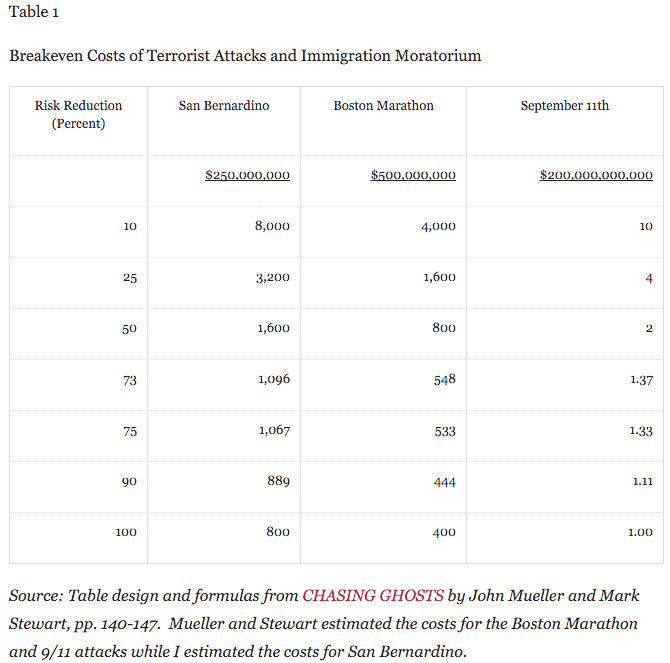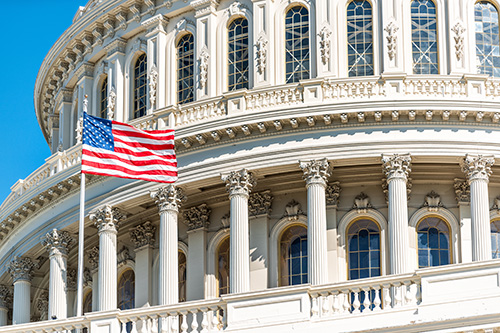Terrorism Does Not Justify Immigration Moratorium
 Some prominent conservatives like Larry Kudlow, David Bossie, and Ann Coulter have now called for a complete moratorium on immigration because of the threat of Islamic terrorism. However, they all focus on the benefits and neglect the costs of such a policy. An immigration moratorium will cost the U.S. economy about $200 billion annually on net, even if it is successful at significantly reducing terrorism.
Some prominent conservatives like Larry Kudlow, David Bossie, and Ann Coulter have now called for a complete moratorium on immigration because of the threat of Islamic terrorism. However, they all focus on the benefits and neglect the costs of such a policy. An immigration moratorium will cost the U.S. economy about $200 billion annually on net, even if it is successful at significantly reducing terrorism.
Costs of Terrorism and the Benefits of an Immigration Moratorium
According to the New America Foundation, jihadists have killed 45 Americans on U.S. soil since 9/11. John Mueller estimates that each murder by jihadists costs about $15 million – double that of other deaths. That means the cost of jihadist terrorism on American soil, just taking in to account the loss of life, is about $50 million a year since 9/11. Let’s double that to $100 million to try and take account of other costs, excluding counter-terrorism spending.
Under the most pessimistic assumptions, 73 percent of convicted terrorists in the decade after 9/11 were foreign-born. Assuming that those 73 percent of immigrant terrorists are responsible for 73 percent of the jihadist murders since 9/11, their annual cost is $73 million. At best, assuming there are no immigrant terrorists currently in the United States, the benefits of reducing terrorism via an immigration moratorium are $73 million annually.
Costs of a Moratorium
Of course, measuring just the benefits of a moratorium is only half of the relevant calculation. We must also estimate the economic costs of a moratorium on all future immigration. Professor Benjamin Powell of Texas Tech University estimated the economic costs of a total immigration moratorium at $229 billion annually – $193 billion in rent-seeking costs and an additional loss of the conservatively estimated $36 billion annual immigration surplus. Powell’s estimate is remarkably similar to Raul Hinojosa-Ojeda’s related estimate that removing 11 million unauthorized immigrants would lower GDP over a ten period by $2.6 trillion (Powell’s ten-year cost is $2.3 trillion).
For the purposes of this projection, I’m going to round down the economic costs of a moratorium to a mere $200 billion annually. Thus, an immigration moratorium that eliminates 73 percent of Islamic terrorism in the U.S. will produce a net cost to our economy of $199,927,000,000 a year. Under the current threat faced by Islamic terrorism, the cost of a moratorium is about 2000 times as great as the benefits under assumptions that greatly exaggerate the threat and undercount the costs. A moratorium produces huge economic costs for very minor benefits.
When Is a Moratorium Worth It?
There are situations where a total moratorium on immigration would be a cost effective counter-terrorism measure, assuming there are no cheaper or more effective security options available.
For an immigration moratorium that costs the U.S. economy $200 billion annually and reduces the number of terrorist murders by 73 percent, it would have to prevent 800 San Bernardino-sized terrorist attacks each year (73 percent of the 1,096) just to break even as a counter-terrorism policy – leaving 296 additional attacks a year undeterred (see Table 1, row 4). If we lived in such a dire security situation then 15,344 Americans inside of the United States would be murdered each year by Islamic terrorists and we would be suffering almost 5.6 San Bernardino-level attacks per week. As tragic and brutal as the San Bernardino terrorist attack was, we can all be grateful that it is rare and that the number Americans actually murdered by jihadists every year is about one-five-thousandth of that number.
Conclusion
A moratorium on all immigration to reduce the threat of Islamic terrorism will cost about $200 billion a year more than it will produce in benefits under the very generous, and unrealistic, assumptions I’ve made here. Security is an important service vital to the maintenance and prosperity of every civilization but we must still judge its worth using the same economic cost-benefit tools we apply to every other decision.
Although the threat from immigrant-caused terrorism is low, some small immigration reforms like allowing immigration agents to search social media or to focus their efforts entirely on detecting security concerns rather than fake marriages will be far more cost effective than a $200 billion annual immigration moratorium. Perhaps we should try those cheaper methods first?









